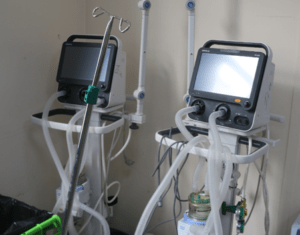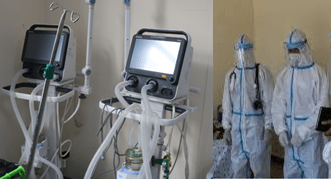KABUL (Pajhwok): Afghanistan’s hospitals have enough ventilators now, but their operators are not qualified and unprofessional use of the devices cause the loss of lives, Pajhwok Afghan News learned reliably on Wednesday.
Ventilators are effective devices that help coronavirus patients facing respiratory problems.
Coronavirus first incepted in the Wuhan City of China and spread world-wide, leaving more than 1.4 million people dead.
According to information of the Ministry of Public Health, 45,940 positive coronavirus cases have been registered in Afghanistan so far, 1,728 deaths and 36145 recoveries.
Afghanistan is currently going through the second wave of the pandemic. According to reports in the past 11 days, 2,455 positive cases were registered or 223 average cases daily.

A ventilator is a machine that provides mechanical ventilation by moving breathable air into and out of the lungs, to deliver breaths to a patient who is physically unable to breathe, or breathing insufficiently. Modern ventilators are computerized microprocessor-controlled machines.

There were complaints regarding the shortage of ventilators in Afghanistan’s hospitals during the first wave of coronavirus.
In July, the Ministry of Public Health (MoPH) said 272 ventilators were available in the country’s hospitals, but MoPH Assistant Spokesperson NoorullahTaraki told Pajhwok Afghan News the ministry obtained more ventilators and 1,020 of these devices were available now, adding in case of need, these devices would be dispatched to hospitals in provinces.
Referring to the second wave of coronavirus, Taraki said the available ventilators were enough because a majority of coronavirus patients did not need artificial breathing.
A specialist doctor at an ICU, wishing not to be named, said considering the population of Afghanistan, the available stock of ventilators was enough.
The source said: “If we allocate three ICU beds for every 100,000 persons in Afghanistan then we should have 1,050 such beds, but the fact that all of them don’t need ventilators, then should have at least 500 ventilators, it will be enough.”
He said if the number of available ventilators as claimed by MoPH in the country was correct, they were more than enough but if properly operated and administered.
“All of these ventilators should be active and should not be faulty. Doctors should know how to operate them. Besides ventilators, other things are necessary such as ABG machines.”

Referring to ABG machines that show the overall health condition of a patient, he said seven to 10 of such machines are active in Afghanistan.
The source said at least up to 100 such machines are important to be available in Afghanistan because ABG machine is considered as the eyes of ventilator and show oxygen and carbon dioxide in the blood.
The issue related to the lack of ABG machine was conveyed to the MoPH but no information was received.
Ventilators operators lack training
The MoPH says ventilator operators had received training from three to 10 days but experts termed this training as insufficient. According to experts, there is need for at least three months training to operate ventilators.
MoPH Assistant Spokesperson NoorullahTaraki said 15 days after the spread of coronavirus in Afghanistan, the need for operators of ventilators and other professional persons to manage ICU was felt.
He said so far 500 specialist doctors, nurses and health personnel had been provided three to 10 days training in this regard and the process was underway.
He said the training was being provided to specialist doctors, normal doctors and nurses. Majority of them were specialist doctors and the remaining were doctors.
The training was provided by the World Health Organisation (WHO).
The training issue was shared with the WHO office in Afghanistan but they did not respond.
The ICU specialist acknowledged 500 persons had been provided up to 10 days training on ICU management and ventilators operation.
“Complete and professional training in the ventilator operation needs at least two years of training and practical work and a period for minimum training is three months.”
But Trakai said the use of ventilators was not difficult and a physician could learn the use of this machine in at least 10 days.
Current number of trained personnel is not enough
The professional said a worker of ICU or a ventilator operator should not have time for sitting and should always be watching.
“The ICU worker should not work more than eight hours because he or she physically and mentally tires, so one doctor and two nurses can control two ventilators in eight hours,” the source said.
Based on his statements, 1,020 ventilators require 510 doctors and 1,020 nurses. The professional said that if 500 ventilators could meet the needs of Afghan hospitals, then there would be need for 255 doctors and 510 nurses to run them.
However, MoPH deputy spokesman said 500 trained personnel were enough for the task. There has been so far no need for using all ventilators, but if needed, the ministry is ready and more personnel are under training, Taraki said.
About the requirement of a doctor and two nurses for operating a ventilator, Taraki said, “I agree, other countries my follow that rule, but we do not have that much resources in Afghanistan, for example, if we see US and China, their resources are much higher compared to ours.”
“Appointing one professional for every ventilator is not a simple job, there is a professional in almost in every room, who train their nurses and personnel how to use it,” he added.
He said Covid-19 was a new disease and for that reason, there were no professionals in Afghanistan and neighboring countries who had received two years of training.
Ventilators’ unprofessional use causes death
After first outbreak of Covid-19 in Afghanistan, there were rumors that most people who received oxygen on ventilators died.
New York Times in a post six months ago said that using ventilators for a patient even in New York was like a death sentence.
The report said that two-third of patients attached to ventilators in (Northwell Health) healthcare center in New York had died and the death toll in other hospitals was also similar.
Pajhwok asked the ICU professional about this in Afghanistan, he said, “Yes, that is true, unfortunately many people lost lives on ventilators during Covid-19 disease, because there was no a professional to operate the ventilators.”
The source said ventilators were not used as required in Afghanistan due to shortage of professionals to operate them.
He said a number of health professionals also died in the first wave of coronavirus in the country but the first doctor who lost his life was due to unprofessional use of ventilator.
However, Taraki said it was not true that most people lost their lives due to their attachment to ventilators or wrong usage.
“What about those large numbers of patients who recovered? If it is not professional use then what is? We have professional personnel and we have offered good services,” he said.
He said the disease was new in Afghanistan and the world and mistakes might have had happened, but the people who died was not due to only unprofessional use of ventilators.
Taraki said only patients who were in critical condition were placed on ventilators and that was also a reason of high death rate.
This report has been produced by Pajhwok and financially supported by UNDP.
Nh/Mds/ma







GET IN TOUCH
NEWSLETTER
SUGGEST A STORY
PAJHWOK MOBILE APP